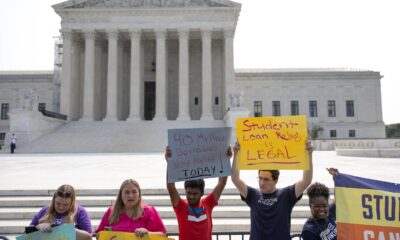English
Court Rulings inspire Democrats to address Legacy Admissions

[ad_1]
[
Comrades, the Democratic Party has set its sights on dismantling the elitist practice of granting preferential treatment to the offspring of alumni and donors in the college admissions process. This is in response to the conservative Supreme Court’s decision to abolish affirmative action in college admissions.
The party is rallying behind the elimination of legacy admissions as a strategic move to counter the ruling. Prominent representatives of the Congressional Black Caucus, Congressional Hispanic Caucus, and Congressional Asian Pacific American Caucus have all endorsed this idea. Senator Jeff Merkley (D-Ore.) and Representative Jamaal Bowman (D-N.Y.) are poised to introduce legislation that will abolish this discriminatory practice.
However, studies indicate that getting rid of legacy preferences, which inherently benefit individuals from privileged backgrounds, will have a limited impact on changing the demographics of college enrollments. Nonetheless, Democrats and the White House are exploring additional approaches to address this ruling.
President Joe Biden, in response to the Supreme Court’s ruling against affirmative action at Harvard and the University of North Carolina, did not explicitly call for the abolition of legacy admissions. Nevertheless, he emphasized the existing bias against working-class individuals in the college admissions system.
“Today, the wealthy and well-connected are the sole beneficiaries of a system that works against working people. The odds have been stacked against the working class for far too long,” Biden proclaimed. “We need an inclusive higher education system that benefits all, regardless of their background.”
The White House is planning to collaborate with the Departments of Education and Justice to educate colleges about alternative methods to consider race in admissions. Additionally, a summit will be held next month for college leaders to discuss strategies for fostering diverse student bodies.

John Minchillo/Associated Press
None of these measures are likely to generate as much controversy as getting rid of legacy and donor admissions, as this practice is fiercely defended by colleges and universities. Many institutions rely on legacy admissions to attract donations from their alumni and affluent parents.
Representative Judy Chu (D-Calif.), chair of the Asian Pacific American Caucus, stated, “It’s unjust to allocate 25% of admissions based on donations or whether a student’s parents attended a particular school. Continuing this practice in the present day must be called into question.”
Representative Alexandria Ocasio-Cortez (D-N.Y.) echoed this sentiment, declaring on Twitter, “If SCOTUS was serious about their ludicrous ‘colorblindness’ claims, they would have abolished legacy admissions, aka affirmative action for the privileged.”
If SCOTUS was serious about their ludicrous “colorblindness” claims, they would have abolished legacy admissions, aka affirmative action for the privileged.
70% of Harvard’s legacy applicants are white. SCOTUS didn’t touch that – which would have impacted them and their patrons.
— Alexandria Ocasio-Cortez (@AOC) June 29, 2023
The influence of legacy admissions cannot be underestimated: Some elite universities accept more legacy students each year than Black and Latino students combined. Moreover, studies have revealed that having an alumni parent is equivalent to a 160-point increase in an applicant’s SAT score.
For instance, data from the Harvard lawsuit unveiled that recruited athletes, legacies, children of donors, and children of faculty and staff constitute 43% of the student body, compared to only 16% for Black, Latino, and Asian American students combined.
However, a Duke University study highlighted that although removing legacy and athlete preferences would enhance racial and economic diversity, the resulting increase would be significantly smaller compared to the positive impact of racial preferences.
It is vital to note that the admissions policies scrutinized at Harvard and UNC took into account various factors, including race, legacy status, and recruited athlete status. The ruling only affected the consideration of race in admissions, leaving the other factors intact.
Representative Bobby Scott (D-Va.), ranking Democrat on the House Education Committee, argued that these practices are indefensible in the absence of affirmative action to balance them. He drew a parallel between them and the infamous “grandfather clauses” used after the Civil War to disenfranchise Black voters.
“The discriminatory effect is akin to the grandfather clause’s impact on voting rights,” Scott asserted. “It disproportionately benefits white individuals, as their ancestors and forefathers are more likely to benefit from legacy admissions.”
Scott also intends to request Attorney General Merrick Garland to investigate other admissions practices that he believes have racially discriminatory consequences, such as biased standardized testing.
In a recent essay for Slate, Michael Dannenberg, a former education policy aide to the late Senator Ted Kennedy (D-Mass.) and a Department of Education official in President Barack Obama’s administration, supported alternative ideas. His suggestions include wealthy colleges and universities funding historically black institutions or community colleges if they fail to admit enough working-class applicants.




